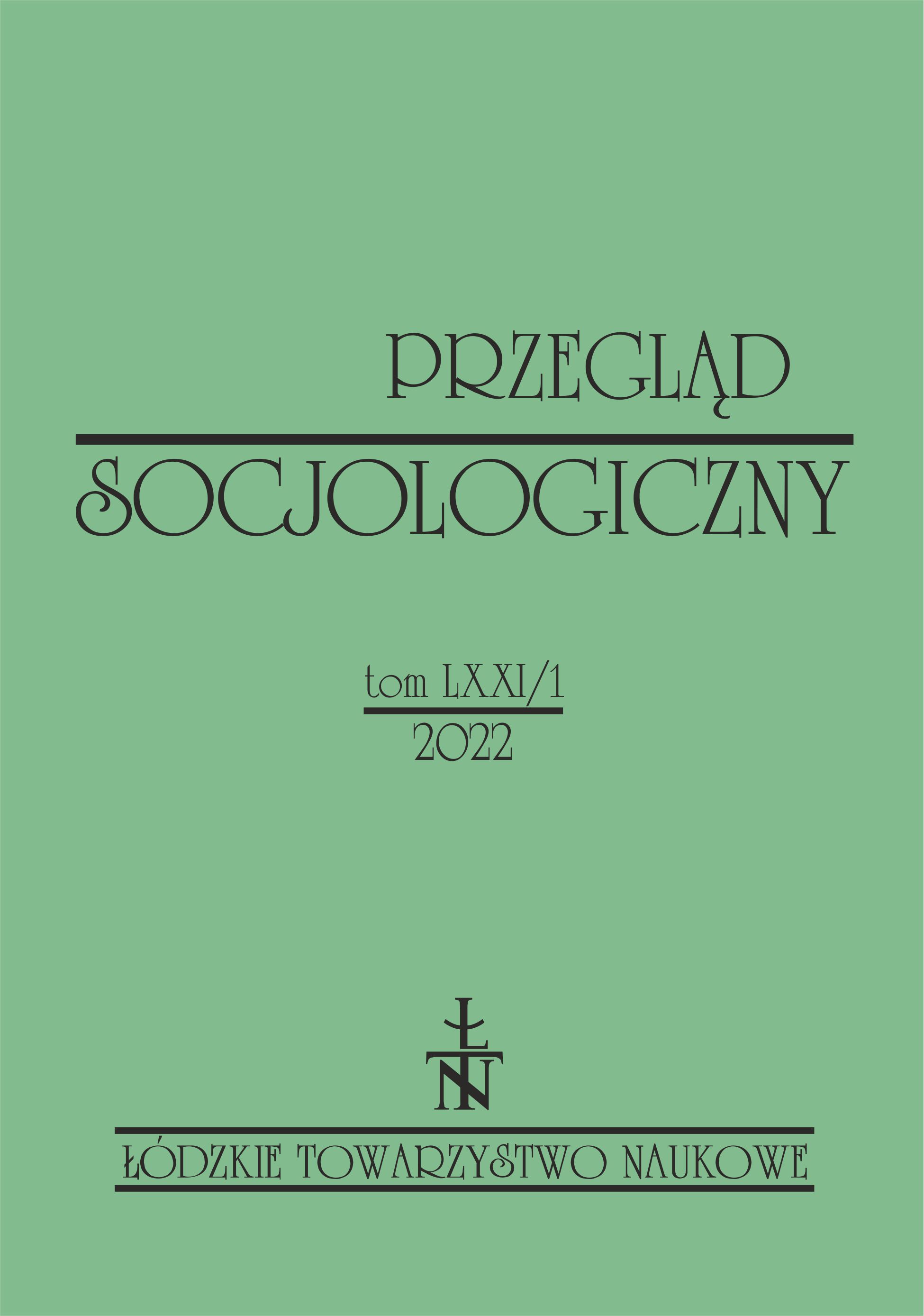The biographical method in the context of conducting qualitive research online – possibilities, limitations and ethical concerns
DOI:
https://doi.org/10.26485/PS/2021/71.1/3Keywords:
biographical interviews, narrative interviews, COVID-19 pandemic, online interviews, qualitative research, ethicsAbstract
The COVID-19 pandemic and many months of lockdown have forced some social scientists to continue to do qualitative research remotely and conduct interviews using online communication platforms. However, the growing popularity of such a way of collecting empirical material causes not only technical difficulties but also raises yet another ethical concern. The aim of this article is to analyse the risks and benefits of conducting online narrative interviews, with particular emphasis on doing biographical interviews. The main question we discuss is: Is it advisable and ethical to continue conducting online biographical research considering the specificity of this method?
The source material which is the basis of this article consists of two parts: 1. the analysis of methodological literature – a review of approaches and standpoints regarding doing research remotely and a summary of the arguments for and against conducting narrative interviews via the Internet; 2. we also rely on the autoethnographic observations of the researchers who participated in our project and the results of the project team’s internal discussions after conducting a trial of three
References
Andrejuk Katarzyna. 2020. “Online qualitative research in immigrant communities: Opportunities and challenges during the pandemic”. Ask: Research and Methods 29(1): 55–73.
Archibald Mandy M., Rachel C. Ambagtsheer, Mavourneen G. Casey, Michael Lawless. 2019. “Using Zoom videoconferencing for qualitative data collection: Perceptions and experiences of researchers and participants”. International Journal of Qualitative Methods 18: 1–8.
Bichi Rita. 2021. “Conducting social research online: Empathetic concern and sociability”. Italian Sociological Review 11(11): 183–193.
Centrum Archiwistyki Społecznej. Nagrywanie i aspekty etyczne w czasie pandemii. Cykl webinariów o historii mówionej, 8 grudnia 2020. https://archiwa.org/wydarzenia/nagrywanie-iaspekty-etyczne-w-czasie-pandemii-cykl-webinari%C3%B3w-o-historii-m%C3%B3wionej [dostęp: 08.12.2020].
Couper Mick P. 2000. “Web surveys: A review of issues and approaches.” The Public Opinion Quarterly 64(4): 464–494.
Deakin Hannah, Kelly Wakefield. 2013/2014. “Skype interviewing: Reflections of two PhD researchers”. Qualitative Research 14(5): 603–616.
Duffy Jill. 2020. How to prevent zoom-bombing. https://www.pcmag.com/how-to/how-to-prevent-zoom-bombing [access: 09.12.2021].
Doboszewska Alina, Jakub Gałęziowski, Marcin Jarząbek, Marek Szajda, Joanna Urbanek. 2020. „COVID-19 a historia mówiona. Rekomendacje Polskiego Towarzystwa Historii Mówionej”. Wrocławski Rocznik Historii Mówionej 10. http://pthm.pl/covid-19-a-historia-mowiona/ [dostęp: 24.07.2021].
Federacja Konsumentów. 2021. Wykluczenie cyfrowe podczas pandemii. https://www.federacja-konsumentow.org.pl/n,6,1479,1,1,wykluczenie-cyfrowe-podczas-pandemii.html [dostęp: 06.09.2021].
Gałęziowski Jakub. 2019. “Oral history and biographical method. Common framework and distinctions resulting from rifferent research perspectives”. Przegląd Socjologii Jakościowej XV(2): 76–103.
Golczyńska-Grondas Agnieszka, Marek Grondas. 2013. “Biographical research and treatment. Some remarks on therapeutic aspects of sociological biographical interviews”. Przegląd Socjologii Jakościowej IX(4): 28–49.
GUS. 2020. Społeczeństwo informacyjne w Polsce w 2020 r. https://stat.gov.pl/obszary-tematyczne/nauka-i-technika-spoleczenstwo-informacyjne/spoleczenstwo-informacyjne/spoleczenstwo-informacyjne-w-polsce-w-2020-roku,1,14.html [dostęp: 05.09.2021].
Iab Polska. 2019/2020. Przewodnik po Social Media w Polsce. https://www.iab.org.pl/baza-wiedzy/przewodnik-po-social-media-w-polsce/ [dostęp: 06.09.2021].
Kaźmierska Kaja, Katarzyna Waniek. 2020. Autobiograficzny wywiad narracyjny. Metoda-technika-analiza. Łódź: Wydawnictwo Uniwersytetu Łódzkiego.
Kaźmierska Kaja (red). 2012. Metoda biograficzna w socjologii. Antologia tekstów. Kraków: Nomos
Kaźmierska Kaja. 2018. “Doing biographical research – ethical concerns in changing social contexts”. Polish Sociological Review 3(203): 393–411.
Lo Iacono Valeria, Paul Symonds, David H.K. Brown. 2016. “Skype as a tool for qualitative research interviews”. Sociological Research Online 21(2): 103–117.
Łuczaj Kamil, Magdalena Holy-Łuczaj. 2020. “Live streaming at international academic conferences: Cooling down the digital optimism”. Elementa. Science of the Anthropocene 8: 1–4.
Moran Lisa, Ana Caetano. 2021. “Biographical research through the looking glass of social distancing: Reflections on biographical interviewing and online technologies in pandemic times”. Irish Journal of Sociology 1: 1–5.
Morgan Charlie, Rob Perks, Mary Stewart, Camille Johnston. 2021. Advice on remote oral history interviewing during the Covid-19 pandemic. https://www.ohs.org.uk/covid-19-remote-recording/ [dostęp: 24.07.2021].
Parncutt Richard, Annemarie Seither-Preisler. 2019. “Live streaming at international academic conferences: Ethical considerations”. Elementa: Science of the Anthropocene 7: 55.
Rosenthal Gabriele. 1993. “Reconstruction of life stories. Principles of selection in generating stories for narrative biographical interviews”. The Narrative Study of Lives 1(1): 59–91.
Sang Katherine, Haya Al-Dajani, Mustafa Özbilgin. 2013. “Frayed careers of migrant female professors in British Academia: An intersectional perspective”. Gender Work and Organization 20(2): 158–171.
Schütze Fritz. 2012. Analiza biograficzna ugruntowana empirycznie w autobiograficznym wywiadzie narracyjnym. W: Metoda biograficzna w socjologii. Antologia tekstów, K. Kaźmierska (red.), 141–278. Kraków: Nomos,.
Seitz Sally. 2015. “Pixilated partnerships, overcoming obstacles in qualitative interviews via Skype: A research note”. Qualitative Research 16(2): 229–235.
Tuttas Carol A. 2015. “Lessons learned using web conference technology for online focus group interview”. Qualitative Health Research 25(1): 122–133.
Waniek Katarzyna. 2020. Ucieczka jako przyczyna mobilności Europejczyków. Łódź: Wydawnictwo Uniwersytetu Łódzkiego.
Weller Susie. 2015. The potentials and pitfalls of using Skype for qualitative (longitudinal) interviews. NCRM Working Paper. Southampton, England: National Centre for Research Methods.



